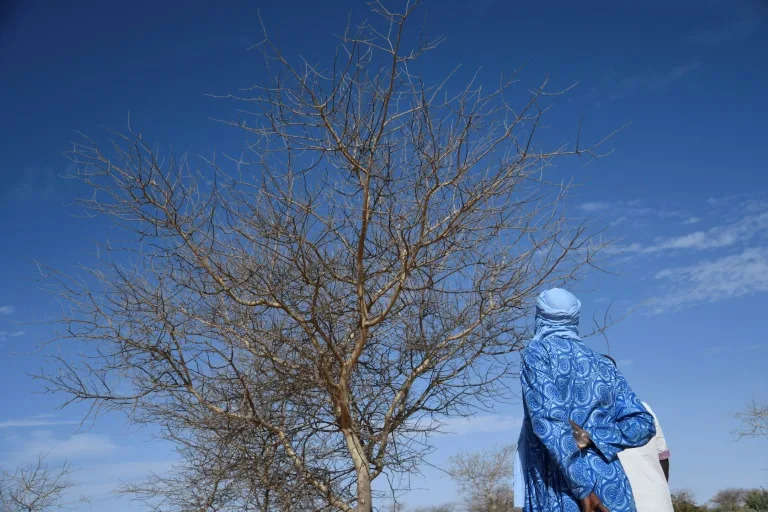Issued on: 01/03/2023
Washington (AFP) – Joni Mitchell, the pioneering singer-songwriter behind poignant hits including "A Case Of You," was set Wednesday to receive a national lifetime achievement award at a star-studded gala celebrating her vast contributions to popular song.
The Canadian-born artist joins an elite coterie of composers including Stevie Wonder, Paul McCartney, Tony Bennett and Carole King in receiving the US Library of Congress' Gershwin Prize, which is named for the brothers behind American standards such as "I Got Rhythm" and "Rhapsody In Blue."
A-listers including James Taylor, Annie Lennox, Herbie Hancock and Graham Nash were primed to pay homage to Mitchell's life and work at the concert ceremony, which will be broadcast on March 31.
The trailblazing Mitchell, 79, has experienced something of a renaissance over the past year, making a return to public life after she suffered a brain aneurysm in 2015 that left her temporarily unable to speak.
She has since undergone extensive physical therapy that's allowed her even to return to performance, which at one point seemed a long shot.
Last summer she delivered her first full set in more than 20 years, surprising attendees at the Newport Folk Festival alongside folk-rocker Brandi Carlile, who was also on deck to perform Wednesday.
That show followed Mitchell's stage cameo earlier in 2022, when she joined other artists as they performed a moving tribute to her life's work at the MusiCares pre-Grammy gala.
Mitchell had last appeared at Newport, an annual festival in Rhode Island, in 1969.
She's slated to headline a "Joni Jam" show this June at Washington state's Gorge Amphitheatre, again alongside Carlile.
'Deeper'
Born in a small town in western Canada, Mitchell had her start playing small clubs and eventually moved to Los Angeles, where she became a pivotal figure in the 1960s Laurel Canyon music scene and beyond.
She punctuated her deceptively simple songs with a distinctive, wide-ranging voice and open-tuned guitar, which lent an idiosyncratic sound to the standard rock and folk of the era.
Mitchell's defining album was 1971's "Blue," which saw her explore romantic grief and musically go deeper into folk.
She mined her own heartache, including breakups with fellow artists Taylor and Nash, to produce the record that's a regular on critics' all-time-best lists.
As it hit its 50th anniversary in 2021, "Blue" charted number one on iTunes -- outperforming even pop sensation Olivia Rodrigo's "Sour."
Even Mitchell voiced astonishment at the resurgence. Asked to explain her return to the top at the MusiCares red carpet last year, Mitchell pointed to her lyricism: "Maybe people want to get a little bit deeper."
© 2023 AFP
March 1, 2023
Heard on Morning Edition
Download
Transcript
Singer-songwriter Joni Mitchell will be presented Wednesday night with the Library of Congress Gershwin Prize for Popular Song. The award is for influence, impact and achievement in popular song.
Sponsor Message
(SOUNDBITE OF JONI MITCHELL SONG, "CHELSEA MORNING")
LEILA FADEL, HOST:
Tonight, the Library of Congress honors one of the most influential singer-songwriters of the late 20th century.
(SOUNDBITE OF SONG, "CHELSEA MORNING")
JONI MITCHELL: (Singing) Woke up, it was a Chelsea morning, and the first thing that I heard was a song outside my window, and the traffic wrote the words.
FADEL: Joni Mitchell receives the Gershwin Prize for popular song, the nation's highest award for influence, impact and achievement in popular song. She's 79 and only the third woman to win the award. A few years back, she told NPR's Renee Montagne that she considers herself a painter who writes songs.
(SOUNDBITE OF ARCHIVED NPR BROADCAST)
MITCHELL: I started singing folk songs in 1964 and '5 for smoking money, really.
RENEE MONTAGNE: And you call that a helium voice in your famous voice.
MITCHELL: 'Cause it's not - right. It was like I sucked on a balloon or something. It was very high, and so was my speaking voice.
(SOUNDBITE OF SONG, "BOTH SIDES NOW")
MITCHELL: (Singing) I've looked at love from both sides now, from give and take...
MONTAGNE: How did you write that at 21? It seemed almost, like, prescient.
MITCHELL: Oh, I'd gone through some bad stuff already - you know, the loss of my daughter, you know? Saw a solution (ph)...
MONTAGNE: Your daughter who you gave up.
MITCHELL: I had to give her up for adoption. But...
MONTAGNE: You were an unwed mother in a time when that really...
MITCHELL: Right - was really rough going. And there was so much prejudice. So, yeah, I'd seen some bad human nature.
(SOUNDBITE OF SONG, "CHINESE CAFE/UNCHAINED MELODY")
MITCHELL: Now your kids are coming up straight, and my child's a stranger. I bore her.
MONTAGNE: You told a newspaper in Toronto, I sing my sorrow and paint my joy.
MITCHELL: Because I'm going to hang, in my house, the paintings of my grandson, landscapes that I love, people that I love or loved. But I don't really want to paint sorrowful stuff. I've been through so much, and I've come through it kind of, oddly enough, kind of in a good mood. I can't explain it. (Laughter) I don't know. I'm a tough, old cookie.
(SOUNDBITE OF SONG, "BOTH SIDES NOW")
MITCHELL: (Singing) I've looked at life from both sides now.
STEVE INSKEEP, HOST:
Joni Mitchell will be honored with a tribute concert tonight as she receives the Gershwin Prize for popular song. And if you're a longtime listener, you knew that other great voice. She was speaking with our own Renee Montagne in 2014.
(SOUNDBITE OF SONG, "BOTH SIDES NOW")
MITCHELL: (Singing) I really don't know life at all.
Copyright © 2023 NPR. All rights reserved. Visit our website terms of use and permissions pages at www.npr.org for further information.
NPR transcripts are created on a rush deadline by an NPR contractor. This text may not be in its final form and may be updated or revised in the future. Accuracy and availability may vary. The authoritative record of NPR’s programming is the audio record.












